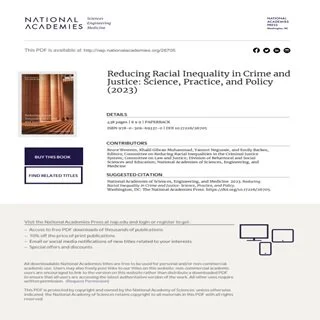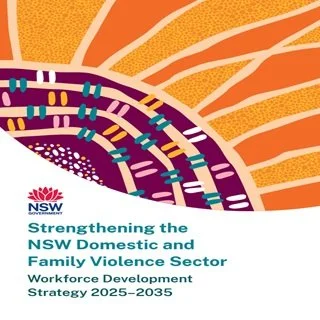By Bruce Western, Khalil Gibran Muhammad, Yamrot Negussie, and Emily Backes
A large research literature has documented substantial racial and ethnic disparities at each stage of the criminal justice process. Black American, Latino, and Native American people have all been found to experience relatively high rates of arrest, pretrial detention, incarceration, and community supervision compared to White people. At the same time, community violence poses a significant risk to health and well-being for disadvantaged communities. Researchers have wrestled with the complex relationship between racial disparities in crime and disparities in criminal justice involvement. Racial inequality can drive disparities in both crime and system involvement; racial differences in criminal victimization, offending, and incarceration can further exacerbate racial inequality in socioeconomic life. In 2020, the Committee on Law and Justice of the National Academies of Sciences, Engineering, and Medicine convened an expert ad hoc committee to review and assess the scientific evidence on how racial inequalities in criminal justice might be reduced through public policy. The Committee on Reducing Racial Inequalities in the Criminal Justice System was assembled to carry out this study and produce a consensus report. The committee reviewed and synthesized a diverse body of evidence from a variety of disciplines, including criminology, sociology, law, economics, psychology, history, and public policy, and it gathered public testimony from a variety of community participants in the course of three public workshops. Box S-1 includes key definitions and terminology derived from these efforts. This report builds on the work of researchers, practitioners, policy makers, and community representatives who have been working to address racial inequality in the criminal justice system for decades. It was prepared in the contemporary context of a global pandemic, the police killings of George Floyd, Breonna Taylor, and other Black Americans, and subsequent protests against racial injustice. Moreover, gun violence—often concentrated in low-income Black communities—increased sharply in 2020 and 2021, posing an additional threat to racial equity. The current moment is thus marked by opportunity and urgency. The report offers an account of the research evidence that can inform the public conversation and the policy discussion over reducing racial inequality in the criminal justice system and advancing racial equity. Given the complexity and deep historical roots of contemporary racial inequality in the United States, the committee has considered both policy reforms to the criminal justice system and policy reforms that address social, economic, and environmental conditions that give rise to inequalities in crime and justice. Criminal justice reforms that can reduce the scale of police stops and prison admissions, the duration of long sentences, and the duration and intensity of community supervision are likely to produce large absolute reductions in criminal justice involvement in minority communities. However, the criminal justice system does not operate in a vacuum, and reductions of criminal justice inequalities also depend in part on social and economic policy. Criminal justice reform can be buttressed by reducing the socioeconomic disadvantages that disproportionately increase the risks of criminal justice contact among the residents of low-income communities, who are disproportionately Black, Latino, or Native American. Given this context, the report considers both criminal justice reforms and alternative strategies that lie outside the criminal justice system for reducing violence and other crime. The committee also found significant limitations in the available data and research evidence and offers recommendations for their development that might also help in overcoming racial inequality.
National Academies of Sciences, Engineering, and Medicine. 2023. Reducing Racial Inequality in Crime and Justice: Science, Practice, and Policy. Washington, DC: The National Academies Press




